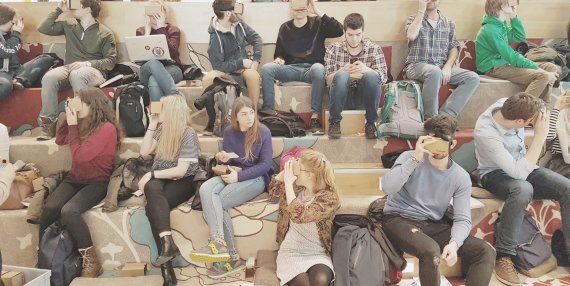© Farming Systems Ecology
Organic agriculture and new technology might not be the first combination that comes to mind, but it is exactly what happened on 29 March in the master’s course Organic Agriculture and Society. Thirty students were shown exemplary organic farms abroad through virtual reality and holograms.
Through virtual reality headsets, they watched a conversation with John Gilliland of the Northern-Irish agricultural company Devenish, while he was standing in a pasture with sheep in Ireland. The students were also shown a hologram of the 170-hectare farm. These images showed them the grasslands and groves of the climate friendly cattle farm, but also the prehistoric sites at the company in the Lands at Dowth.
Soil
In this experimental lecture, the lecturers of Farming Systems Ecology, professor Rogier Schulte and Blair van Pelt, show a series of Lighthouse Farms: farms that distinguish themselves through a specific style of sustainability in their company. The peculiar thing about Devenish is that the farm combines cattle farming with the five archaeological sites of olden civilisations – the oldest being 5,500 years old. Besides that, precision agriculture ensures that the organic company improves the fertility of the soil and the quality of the grass. Additionally, the equilibrium fertilisation and the presence of groves help the company actively pursue climate neutrality. Company director John Gilliland didn’t merely explain all this through virtual reality but was also present live in Impulse.
HoloLens
The experimental lecture did not run entirely smoothly. It took a while before everyone was able to get the cardboard virtual reality headset working using their own smartphones. But the students were patient and sat through the entire session. As an encore, they were given the opportunity to test Microsoft’s HoloLens, which gave them a three-dimensional impression of the Irish domain. With the glasses, the virtual company was right beneath the students’ feet in Impulse. In the future, students should also be able to interact with this virtual reality and see the effects of their management decisions in the hologram.

